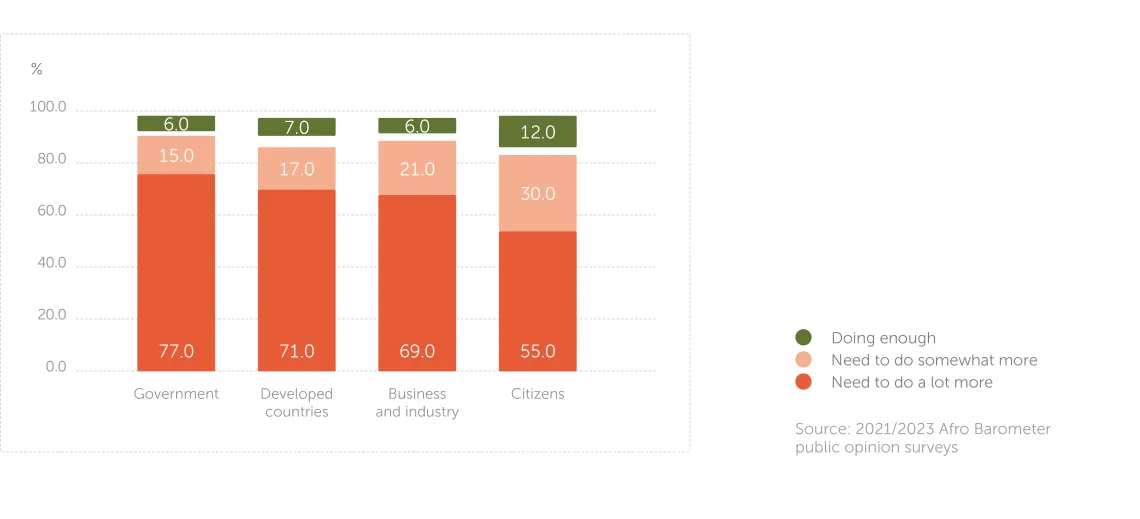Africa expects increased and immediate action from COP28
07 November, 2023
Africa faces challenge of reconciling climate and development goals
Africa has the lowest per capita fossil fuel emissions of any region globally and between 1850-2021 was responsible for only 2.8% of global fossil fuel emissions. Yet according to the Intergovernmental Panel on Climate Change, it faces the most severe challenges due to climate change. The negative effects of climate change on the African continent have become increasingly vivid through disasters such as floods, earthquakes, and drought. Seven out of the ten most vulnerable countries by climate change in 2021 were African.
Africa is the world region most affected by droughts and second most affected by floods since 2010.
Zimbabwe suffered a 4.3% GDP loss and as much as $1.8 billion in real monetary value. from the Cyclone Idai in 2019.
The continent’s limited capacity to respond and adapt to ongoing climate disasters is mainly due to lower levels of economic development, which itself is closely linked to historic emissions.
- 13 out the 20 world’s most climate vulnerable countries are also among the 20 poorest countries in GDP per capita terms.
- Nine of the 10 countries with the highest historic fossil fuel emissions are among the 10 largest economies today.
It is therefore important that Africa goes to COP28 with an agenda that takes into account progress on its own development goals and address issues such as energy access, food security, infrastructure and housing.
- Climate change is forecasted to push an additional 78 million people into chronic hunger by 2050, over half of them in sub-Saharan Africa.
- More than 45% of Africa’s urban population live in slum households. Slum households and informal settlements are particularly vulnerable to flooding.
- Almost 600 million people in Africa have no access to electricity, more than the combined population of France, Japan, the US and the UK
The ACS Nairobi Declaration: A Common African Position put forward by African leaders.
The Africa Climate Summit (ACS) took place in September 2023 in Nairobi, Kenya. African government leaders and other key stakeholders met to discuss how to drive green growth and provide climate finance solutions for Africa and the world.
During the summit, AU member state leaders signed the Nairobi Declaration which will serve as a basis for Africa’s common position in the global climate change process to COP28 and beyond. It calls for economic transformation that is in line with Africa’s climate needs including:
- Increasing Africa’s renewable generation capacity from 56 GW in 2022 to at least 300 GW by 2030.
- Establishing a new financing architecture that is responsive to Africa’s needs including debt restructuring and relief, including the development of a new Global Climate Finance Charter through UNGA and COP processes by 2025.
- Introducing a global carbon tax regime including a carbon tax on fossil fuel trade, maritime transport, and aviation, that may also be augmented by a global financial transaction tax (FTT) to provide dedicated, affordable, and accessible finance for climate-positive investments at scale.
Civil society activists felt the summit agenda promoted ‘the position and interests’ of the Global North. Carbon credits and carbon sequestration were specifically criticised for being false solutions that give polluters a free ride. The summit was also criticised for its inadequate focus on strengthening climate adaptation capacities within African communities.
African citizens demand urgent government action on climate change.
The majority of Africans are aware of climate change, and more than half of the population has been affected negatively.
According to 2021/2023 Afrobarometer survey data, about half (51%) of citizens across 39 countries have heard of climate change with awareness levels as high as 80% in Seychelles and 74% in Malawi. Among Africans who are aware of climate change, 72% of these say it is making their lives worse.
Awareness of climate change
Negative effects of climate change
Majority of Africans think governments need to do more to limit the impacts of climate change
74% of Africans in 39 countries want their government to take action now to limit climate change and its impacts. They are ready to support this even if it is costly, causes job losses, or takes a toll on the economy. In 14 countries, 80% or more of citizens who are aware of climate change share this view.
Citizens’ low levels of approval of government efforts against climate change impacts were found to be consistent across age groups, genders, urban-rural locations, and education levels. Rural and poor citizens particularly those working in the agricultural sector were found to be more negatively affected by climate change events such as floods and droughts.
Citizens highlighted deforestation, poor waste disposal management and pollution of water sources as key environmental issues to be dealt with. The responsibility is partly shared with other stakeholders including developed countries as well as the business community.
COP28 presents an opportunity for Africa to voice its climate needs as well as the valuable solutions that the continent has for the global crisis. It is also a chance to ensure that Africa’s development priorities are streamlined into the global climate agenda because for Africa, the climate challenge is a development challenge.
Are stakeholders doing enough to limit climate change?



